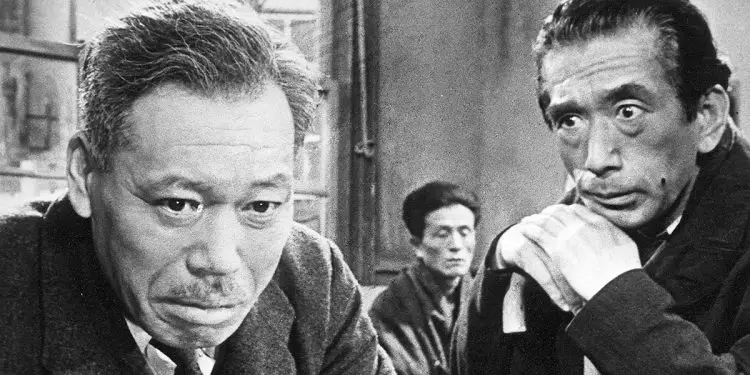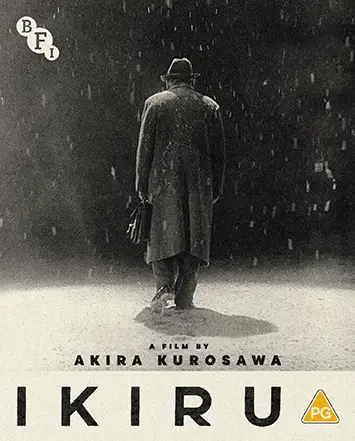Ikiru (1952) – Film Review

Director: Akira Kurosawa
Cast: Takashi Shimura, Nobuo Kaneko, Shin’ichi Himori
Certificate: PG
By Sarah Morgan
For most people, the mention of Akira Kurosawa’s name conjures up images of samurai thanks to his masterpieces Rashomon, Throne of Blood, Seven Samurai and Yojimbo. The last two on that list were, of course, turned into the classic Westerns The Magnificent Seven and A Fistful of Dollars.
However, not all of the 30 films made by the Japanese auteur featured warriors. He also directed smaller tales of ordinary life, and perhaps the most extraordinary of those is Ikiru.
 Toshiru Mifune is the actor perhaps most associated with Kurosawa, but here it’s another of his long-term collaborators, Takashi Shimura, who takes centre stage as Kanji Watanabe, a meticulous bureaucrat who has spent 30 long, laborious and boring years working within Tokyo’s public works department.
Toshiru Mifune is the actor perhaps most associated with Kurosawa, but here it’s another of his long-term collaborators, Takashi Shimura, who takes centre stage as Kanji Watanabe, a meticulous bureaucrat who has spent 30 long, laborious and boring years working within Tokyo’s public works department.
“A figure of fun”
Widowed Watanabe is something of a figure of fun for his junior colleagues, while his son and daughter-in-law live in his house, but seem desperate to get away, perhaps by using Wanabe’s own money to fund a new home.
But things begin to change when the old man discovers he has only months to live. Suddenly determined to make up for lost time, he fails to show up for work and sets out to enjoy himself, initially by going out on the town or escorting a young woman from his office during various days out. But finally, he finds a way to leave a lasting legacy – by building a children’s playground on a useless piece of land.
Watanabe dies well before the end of the film, leaving those who knew him to discuss the impact he made on their lives and on the city.
Ikiru translates as ‘To Live’, which is fitting for a tale that seems to urge its viewers not to waste time, but to get on with things, and to carry out deeds that will benefit themselves and others.
That makes it sound as if the film is somewhat preachy, but that’s not the case; it’s a deceptively simply told story, but one that is full of insights into the human psyche. It also wags its finger at post-war Japanese bureaucracy – something that, actually, doesn’t seem all that removed from the kind of annoying situations we can all find ourselves in when faced with the rules and regulations of various public services.

“A cautionary tale”
Shimura delivers a touchingly low-key performance; he portrays Watanabe as an ordinary man who has always tried to do his best, something that has left him feeling hollowed out and empty – until he finds a worthy task on which to devote his final days.
Ikiru isn’t going to keep you on the edge of your seat in the same way as Kurosawa’s more famous films do, but its pared-down nature offers other, far more simple, homespun delights. It also acts as a cautionary tale to those who procrastinate – don’t leave things too late, because you never know what fate has in store.
Among the special features to look out for in this two-disc, 4k restoration are an introduction by Alex Cox, a documentary focusing on Kurosawa and a wonderful report from 1972 about a group of working-class mothers whose efforts to create an adventure playground for their children brought them into conflict with the local council in inner-city London.
Special features
- Restored in 4K and presented in High Definition
- Audio commentary by film critic Adrian Martin
- Akira Kurosawa: It is Wonderful to Create – Ikiru (2002, 42 mins): made as part of the Toho Masterworks series and featuring interviews with Kurosawa, script supervisor Teruyo Nogami, writer Hideo Oguni, actor Takashi Shimura and others
- Introduction by Alex Cox (2003, 15 mins)
- It’s Ours Whatever They Say (1972, 39 mins): a community action film by Jenny Barraclough telling of the battle fought by a group of mothers against a London council to establish a playground for children on a derelict site
- The People People (1970, 22 mins): intended for school leavers, this COI film shows the vast range and variety of jobs available within the civil service, highlighting the ways in which civil servants help individuals, the community in general and Parliament
- Original theatrical trailer
- Image gallery
- First pressing only - Illustrated booklet with essays by Tony Rayns and James-Masaki Ryan, a review originally published in Monthly Film Bulletin in 1959, notes on the special features and film credits
Ikiru is released on 2-disc Blu-ray by the BFI








